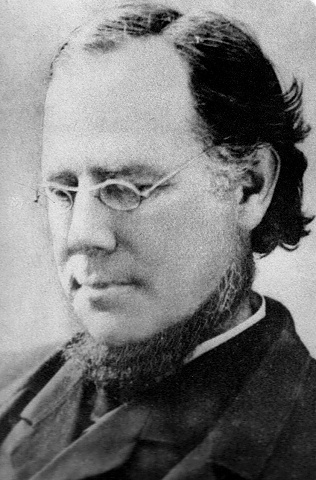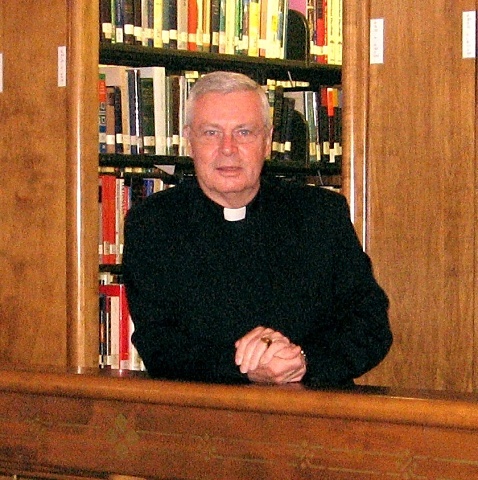September 3, 2012
This is the nineteenth in a series of previously unpublished reflections from the 1854 spiritual notebook of Paulist Founder, Servant of God Father Isaac T. Hecker. The reflection series is being made pubic in conjunction with Father Hecker’s cause for canonization. Father Paul Robichaud, CSP, Paulist historian and postulator for Father Hecker’s cause for sainthood, offers a response to Father Hecker’s reflection.

To have been in the company of Jesus and conversed with Him when he walked upon the earth was a great, a very great privilege! How much the hearts of His disciples been opened and the faculties of their souls drawn to all virtues in His presence! How much greater is our privilege to receive in the Blessed Sacrament, Jesus into our hearts! The change which Jesus in the Blessed Sacrament works in our souls is far more substantial, effective and greater.
There is no living without eating; and the food which we partake of must be of similar nature as the life which it goes to support. Therefore the divine life in the soul must languish and die without the divine food of the Blessed Sacrament.
(Louis) Lallemant writes that our union with the Blessed Sacrament is fourfold: 1. That Jesus is present for those who are in the state of sin. 2. That affection and friendship with Jesus happens when one is in the state of grace. 3. That union with Jesus is intimate when one receives the body and blood of our Lord. 4. Our Lord unites Himself to us, transforming us into His own self. “A soul that is well disposed,” says Lallemant “receives more intensity in one communion than that caused by all the visions that all the saints have ever had.”
On the festival of the institution of the Blessed Sacrament; who can say anything other than: silence – silence – silence – adore and love – joy and peace!

Exposition of the Blessed Sacrament emerged from a desire of the faithful in the medieval church to repeat and extend that moment in the celebration of the Mass when the priest holds up the Eucharist before the congregation. Benediction or the blessing with the Eucharist derived from the Corpus Christi processions, where at various stations along the processional route the priest would show the Eucharist and bless those gathered. What had begun in the early medieval church as the reservation of the Eucharist for the sick and the dying had developed by the thirteenth century into an extensive Eucharistic devotionalism composed of expositions, processions and benediction.
When Father Hecker wrote these passages in 1854, it was in a church formed by the Council of Trent. The Council had recommended eucharistic adoration which reenforced the real presence of Christ in the Eucharist. Yet at the same time, Trent taught that eucharistic devotions were to be in harmony with the celebration of the Eucharist which was the primary action of the church; and encouraged frequent communion as the principal means to be united to Christ. Some three centuries later in Father Hecker’s time, it still remained difficult to persuade the faithful to receive communion frequently – something he attempts in these passages.
Father Hecker reminds us that the gift of the Eucharist is like being in the company of Jesus when He walked upon the earth; for in the Eucharist we have the privilege of not only following Christ but uniting with Christ as well. Just as we need to eat to sustain our human life so we need to receive the Eucharist to sustain the gift of eternal life. Finally Father Hecker citing the French Jesuit Louis Lallemant reminds us that while Christ is present in our world and in many different ways, we have to engage Christ’s presence with open hearts. While God’s gift of presence does not depend on our disposition; if there is not an openness on our part – in faith, hope and love – there is little possibility of our transformation.
About Father Isaac Hecker’s 1854 Spiritual Notebook:
Servant of God, Father Isaac Hecker wrote these spiritual notes as a young Redemptorist priest about 1854 and they have never been published. Hecker was 34 years old at the time, and had been ordained a priest for five years. He loved his work as a Catholic evangelist. The Redemptorist mission band had expanded out of the New York state area to the south and west, and the band’s national reputation grew. Hecker had begun to focus his attention on Protestants who came out to hear them. To this purpose Hecker began to write in 1854 his invitation to Protestant America to consider the Catholic Church, “Questions of the Soul” which would make him a national figure in the American church.
Hecker collected and organized these notes that include writings and stories from St. Alphonsus Liguori, the Jesuit spiritual writer Louis Lallemant and his disciple Jean Surin, the German mystic John Tauler, St. Thomas Aquinas and St. Jane de Chantal among others. These notes were a resource for retreat work and spiritual direction and show Hecker’s growing proficiency in traditional Catholic spirituality some ten years after his conversion to the Catholic faith. They are composed of short thematic reflections.